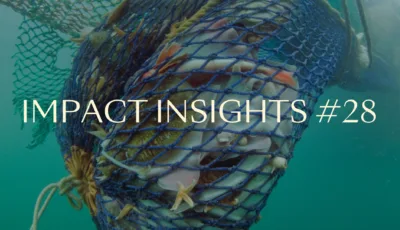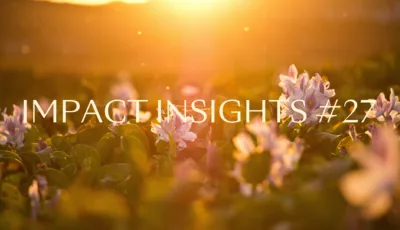Norselab’s three takeaways from the 2022 GIIN Investor Forum

Mid October, Norselab traveled to The Hague for the much-awaited Global Impact Investing Network’s 2022 Investor Forum, the largest the largest in-person gathering for the global impact ecosystem. On the agenda: Advancing and scaling the impact investing market by bringing all the crucial elements of the world’s impact ecosystem together in one place.
Alongside our strategic partner Capricorn Investment Group, I had the opportunity to convene with over 1,500 impact-driven people in the global investor community. Here are three of my takeaways from the GIIN Investor Forum 2022.
1. Impact should no longer be a small share of your investments; it should permeate all investing activities and become embedded in the global financial system.
One number reverberated throughout the GIIN Forum; USD 1.164 trillion. That’s the record-high size of the impact investing market, as announced by GIIN CEO Amit Bouri in the opening remarks. The 40% growth in AUM dedicated to impact shows how the demand for impact is growing among investors globally.
However, the deadline for achieving the SDGs, 2030, is fast approaching. We’re still USD 2,5 trillion short of what we need to fund the solutions to get there, according to GIINs Chief Research Officer, Dean Hand. In The GIIN’s 2022 Market Sizing Survey, closing the gap will require 1.1% of all assets held by banks and institutional asset owners.
We could hear it from the stage, but also in conversations throughout the event: we should stop thinking of impact as a small share of our investing activities. Impact should be a lens that we apply across asset classes, and that should permeate the entire financial system.
Although most asset managers tend to treat impact as a separate asset class, more are moving in the right direction. At Norselab, we are dedicated to proving that impact is the future of investing across asset classes. We started in the obvious place: venture, where the companies of tomorrow are being built. But we’re already expanding into the credit space with the first-of-it's kind impact high-yield fund this year, and looking to further expand into new asset classes in 2023. We want to be among the ones that initiate the mass-scale capital transition into impact investing.
2. Impact does not mean “concessionary”.
We are approaching a tipping point for impact; the market's appetite for impact-focused products is growing fast. Impact investing has often been described as concessionary, meaning an investor would forego financial return in exchange for social or environmental impact.
However, it looks like we’re about to bust this myth. According to a GIIN survey, 95% of impact products targeting market-rate or better returns.
A paradigm shift is happening in the "sustainable investing" space. Recent regulatory developments targeting greenwashing, and the hullabaloo around ESG have attracted a lot of attention. Both professionals and regular people question whether money allocated to “sustainable investing” is truly contributing to the change we need to achieve the Sustainable Development Goals by 2030. The previous focus was on sustainability factors’ impact on a company's financial performance; Now, the focus is shifting toward the real impacts a company generates on people and the planet.
So let’s abandon the outdated view that impact requires financial concessions. A profound transformation of the entire economy is ahead of us, and the demand for businesses to contribute to that transformation is ever-increasing. Impact investing recognizes this powerful macro trend. Impact and commercial success are no longer mutually exclusive; they are intrinsically tied.
3. “The past is a poor predictor of the future”.
Dr. Steve Howard, Chief Sustainability Officer at Temasek, Singapore’s Sovereign Wealth Fund, stated from the GIIN Investor Forum Plenary stage that one of the principles he applies in the Anthropocene is that “the past is a poor predictor of the future”. This is one of the statements that stuck with me throughout the conference and in the various conversations I had. As the global economy is transforming, our old habit of predicting future opportunities based on what turned out to be an opportunity in the past, does not work anymore.
Past references cannot tell us what will be a good investment in the future that we are now building. In the past, financial success or economic growth came at the expense of finite resources. Our mission as impact investors is to understand which future we must create, and take the vast opportunities that lie in it. We will generate competitive financial returns if we see those opportunities; and we already are. According to the GIIN, an overwhelming number of respondents - 99 % ! - of their annual survey state that returns on impact investments exceeded their expectations. But the difference with conventional investing is this: the impact returns are just as important as the financial returns.
Investors win and the planet wins.
If you’re curious about how we at Norselab approach impact, head to our latest Meaningfulness Report for an introduction.


